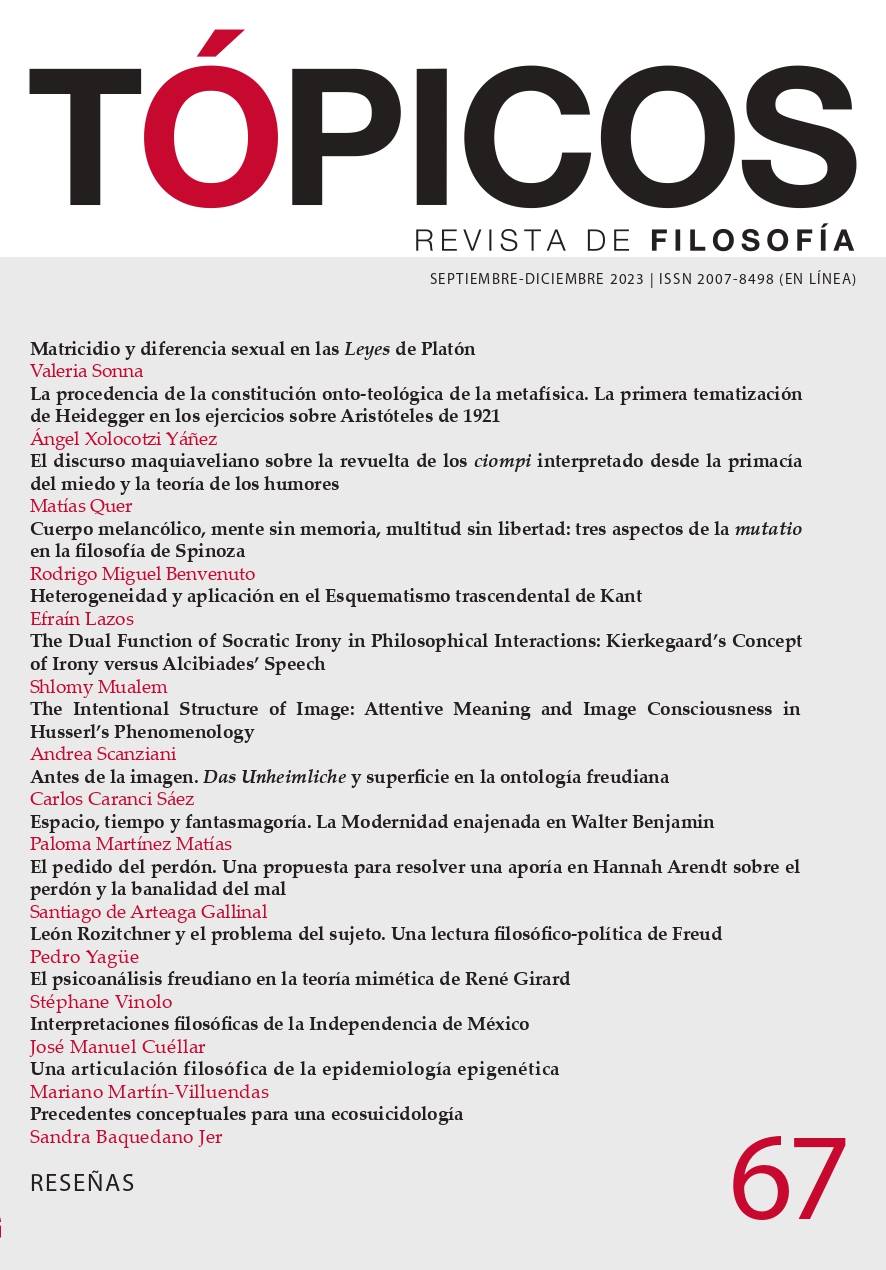Publicado 2023-08-01
Palabras clave
- Passagenarbeit,
- mercancía,
- fetichismo,
- capitalismo,
- Marx
- historia,
- tedio,
- infierno ...Más
Derechos de autor 2023 Tópicos, Revista de Filosofía

Esta obra está bajo una licencia internacional Creative Commons Atribución-NoComercial-SinDerivadas 4.0.
Cómo citar
Resumen
Este artículo parte de una interpretación del concepto de “fantasmagoría” en el Trabajo de los pasajes de Walter Benjamin según la cual su sentido supone una ampliación de la comprensión marxiana de la ideología que lo lleva a englobar tanto el terreno de las ideas de la sociedad moderna como la materialidad de sus producciones culturales y sus formas de experiencia en su interacción recíproca. Sobre esta base, y atendiendo al componente onírico que Benjamin atribuye a lo fantasmagórico, el artículo analiza en qué consisten lo que llama las fantasmagorías del espacio, vinculadas a la figura del flâneur, y las fantasmagorías del tiempo, que asocia al personaje del jugador. Dada la correspondencia que además establece entre estas dos clases de fantasmagorías, se propone una hipótesis hermenéutica que explica su correlación, así como el significado que esta adquiere en el proyecto de los pasajes.
Referencias
- Benjamin, W. (1991a). [GS I a]. Das Paris des Second Empire bei Baudelaire. En Gesammelte Schriften. Band I. R. Tiedemann y H. Schweppenhäuser (eds.). (pp. 511-604). Suhrkamp.
- Benjamin, W. (1991b). [GS V]. Das Passagen-Werk. Gesammelte Schriften. Band V. R. Tiedemann (ed.). Suhrkamp.
- Benjamin, W. (1991c). [GS II]. Gesammelte Schriften. Band II-1. R. Tiedemann y H. Schweppenhäuser (eds.). Suhrkamp.
- Benjamin, W. (1991d). [GS II]. Gesammelte Schriften. Band II-2. R. Tiedemann y H. Schweppenhäuser (eds.). Suhrkamp.
- Benjamin, W. (1991e). [GS I b]. Über den Begriff der Geschichte. En Gesammelte Schriften. Band I-2. (pp. 691-704). R. Tiedemann y H. Schweppenhäuser (eds.). Suhrkamp.
- Benjamin, W. (1991f). [GS I c]. Über einige Motive bei Baudelaire. En Gesammelte Schriften. Band I-2. (pp. 605-653). R. Tiedemann y H. Schweppenhäuser (eds.). Suhrkamp.
- Buck-Morss, S. (2001). Dialéctica de la mirada. Walter Benjamin y el proyecto de los Pasajes. N. Rabotnikof (trad.). Antonio Machado.
- Cohen, M. (2006). Benjamin’s Phantasmagoria: The Arcades Project. En D. S. Ferris (ed.), The Cambridge Companion to Walter Benjamin. (pp. 199-220). Cambridge University Press.
- Doherty, B. (2006). The “Colportage Phenomenon of Space” and the Place of Montage in The Arcades Project. En B. Hanssen (ed.), Walter Benjamin and the Arcades Project. (pp. 157-183). Continuum.
- Elsaesser, T. (2009). Between Erlebnis and Erfahrung: Cinema Experience with Benjamin. Paragraph, 32(3), 292-312.
- García, L. I. (2012). Para un materialismo del umbral. Walter Benjamin entre mito y razón. Constelaciones. Revista de Teoría Crítica, 4, 207-229.
- Gasca Salas, J. (2020). “Perderse en la ciudad” en Walter Benjamin. Explanación y desinencias. Revista de Estudios Sociales, 71, 28-39. DOI: https://doi.org/10.7440/res71.2020.03.
- Hernández Castellanos, D. A. (2014). La ciudad de las fantasmagorías. La modernidad urbana vista a través de sus sueños. Andamios, 11(25), 243-271.
- Löwy, M. (2005). Walter Benjamin: aviso de incendio. Una lectura de las tesis “Sobre el concepto de historia”. H. Pons (trad.). FCE.
- Lukács, G. (1975). Historia y conciencia de clase. Barcelona: Grijalbo.
- Martínez Marzoa, F. (1983). La filosofía de “El capital” de Marx. Taurus.
- Martínez Matías, P. (2021). Fantasmagoría y despertar. Una aproximación al Libro de los pasajes de Walter Benjamin. Logos. Anales del Seminario de Metafísica, 54(1), 107-129. DOI: https://doi.org/10.5209/asem.74709.
- Marx, K. (1960). [MEW 8]. Der achtzehnte Brumaire des Louis Bonaparte. En K. Marx y F. Engels, Werke. Band 8. (pp. 111-207). Dietz.
- Marx, K. (1968). [MEW 40]. Ökonomisch-philosophische Manuskripte aus dem Jahre 1844. En K. Marx y F. Engels, Werke. Band 40. (pp. 465-590). Dietz.
- Marx, K. (1972). [MEW 23]. Das Kapital. Kritik der politischen Ökonomie. Buch I: Der Produktionsprozeβ des Kapitals. K. Marx y F. Engels, Werke. Band 23. Dietz.
- Weber, T. (2000). Erfahrung. En M. Opitz y E. Wizisla (eds.), Benjamins Begriffe. Band I. (pp. 230-259). Suhrkamp.
- Weidmann, H. (1992). Geistesgegenwart: Das Spiel in Walter Benjamins Passagenarbeit. MLN, 107(3), 521-547.
- Wohlfart, I. (2011). Die Passagenarbeit. En B. Lindner (ed.), Benjamin-Handbuch. Leben – Werk – Wirkung. (pp. 251-274). Springer.
- Zamora, J. A. (2018). Devolver al materialismo histórico su rostro mesiánico: Karl Marx y Walter Benjamin. En F. Salinas (ed.), 200 años con Marx. (pp. 167-195). Universidad de Guadalajara.





